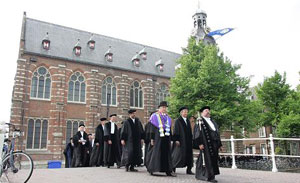Dutch HE-mergers under fire

‘Plans for three major Dutch universities to merge are opposedby more than half of their academics and students, according to asurvey published today. The survey shows that 61% of academics areagainst the merger. Only 7% of scientists and 10% of students thinkmerging is a great idea. At Delft University of Technology evenmore people oppose a merger. A survey by the university newspaperDelta shows that 72% of scientists and students are against it,”
Complementing each other
Most people are concerned that the three universities togetherwith their 55,000 students will become a gigantic moloch destroyingits constituent parts. They fear bureaucracy, redundancies and theloss of their universities’ good names. “The specialties of thethree universities complement each other,” said the president ofthe executive board of Delft University of Technology, Dirk-Jan vanden Berg. “By cooperating we could attract more research money,better scientists and students.”
He emphasised that universities in emerging economies aregetting better every year and the rich universities are gettingeven richer. “At the moment we are doing well in the rankings, andwe want to keep it that way. In order to do so we should cooperate.We could, for example, set up research cooperation between biologyat Leiden, nanobiology at Delft and medicine at Rotterdam. We willbring together world class departments, attract more research moneyand make the departments become better than they already are.”
Van Vught’s view and Inholland’s experience
Cooperation has been discussed, partly in secret, by the threeuniversities since 2009. This was further related to a strategicagenda that every university has to present in May 2012 to HalbeZijlstra, Dutch Junior Minister of Education. The universitiesdecided to develop this agenda together. “The merging ofuniversities has become an international trend,” said Frans vanVught, internationalisation expert and former rector at theUniversity of Twente.
“Several universities in Denmark, Germany and England havemerged, for example. All for more or less the same reason: tocompete internationally and to create a larger investment capacity,particularly in research. I believe the merging of the three Dutchuniversities could result in an excellent university. But only ifthey focus on bringing the best departments together. To besuccessful internationally as a university one has to be rich,rather than very big,” Vught said.
In the Netherlands, many oppose university mergers due to badexperience in the past. In 2003, several universities of appliedsciences (hogescholen) merged into Inholland which became aninstitution with 37,500 students. Two years later, an educationinspection concluded that the level of education of several courseshad declined significantly. In 2010, the Dutch press reported casesof diploma fraud at Inholland.
Meest Gelezen
Vrouwen houden universiteit draaiende, maar krijgen daarvoor geen waardering
Wederom intimidatie van journalisten door universiteit, nu in Delft
Hbo-docent wil wel rolmodel zijn, maar niet eigen moreel kompas opdringen
‘Burgerschapsonderwijs moet ook verplicht worden in hbo en wo’
Raad van State: laat taaltoets nog niet gelden voor hbo-opleidingen

